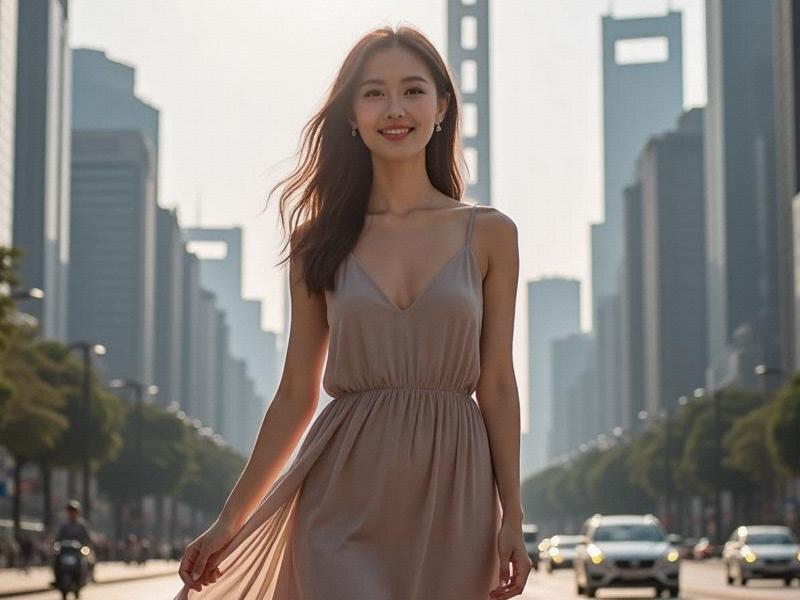
The morning mist over the Huangpu River parts to reveal a scene that encapsulates Shanghai's feminine mystique - a group of women practicing tai chi in Xintiandi's stone-paved alleys, their movements as precise as their Valentino handbags. This is the living paradox of Shanghai beauty: where silk meets smartphone, where centuries-old grooming rituals coexist with cutting-edge cosmetic technology.
Shanghai's reputation for producing China's most sophisticated women dates back to the 1920s, when the city became a melting pot of global influences. Today's Shanghai woman carries this legacy forward with remarkable adaptability. "We call it 'hǎipài' style," explains fashion historian Professor Chen Xiaowei, referring to Shanghai's distinctive cultural blend. "It's about taking the best from everywhere while keeping your Shanghainese essence."
Walking through the French Concession, this fusion becomes visible everywhere. Young professionals like 26-year-old investment banker Olivia Xu exemplify the trend - her work wardrobe combines custom-tailored qipaos with Theory blazers, her makeup routine blends Song Dynasty face-powder techniques with La Mer skincare. "My grandmother used pearl powder, I use peptide serums," Xu laughs. "Same goal, different tools."
上海龙凤419会所 The city's beauty standards reflect its mercantile history. While other Chinese cities might prioritize delicate "melon-seed" faces, Shanghai appreciates what locals call "business beautiful" - features that convey both approachability and authority. Plastic surgery clinics report high demand for subtle enhancements that "optimize" rather than transform. "Shanghai women want to look successful, not artificial," says Dr. Zhang of United Family Healthcare.
This pragmatism extends to fashion. Unlike Beijing's political wives who favor conservative luxury or Shenzhen's tech elites embracing athleisure, Shanghai women developed a signature aesthetic that's polished yet playful. The current "CEO casual" trend sees women pairing $2,000 Max Mara coats with local designer sneakers - a look perfected by social media influencer RealShanghaiGirl, whose "9-to-9" style guides (tracking outfits from boardroom to bar) have garnered 4.7 million followers.
上海贵族宝贝sh1314 Yet beneath the glamorous surface lies intense pressure. The "Shanghai Princess" stereotype - referring to women raised as pampered only children - masks a generation pushing professional boundaries. At WeWork offices across the city, female entrepreneurs like Jessica Wang are redefining expectations. Her fintech startup employs 85% women. "We joke that our company runs on high heels and high IQ," says Wang, whose team regularly works past midnight despite their impeccable manicures.
Cultural commentators note this duality. "Shanghai women mastered the art of having it all before it was a Western feminist slogan," notes author Lijia Zhang. "They'll debate Proust over afternoon tea, then negotiate million-dollar deals - all while maintaining flawless lipstick." This balancing act reaches its zenith during the qipao revival each Shanghai Fashion Week, when young designers reinterpret the iconic dress for modern bodies and lifestyles.
爱上海 The phenomenon isn't without critics. Some argue Shanghai's beauty standards promote elitism, noting the popularity of "international kindergarten mom" makeovers among wealthy matrons. Others point to the city's infamous marriage markets, where parents still advertise for "fair-skinned, slender" daughters-in-law. Yet change is coming - feminist collectives like "Lipstick Revolution" host monthly forums challenging traditional norms.
As the city skyline twinkles at night, Shanghai women continue their graceful navigation between tradition and transformation. Whether sipping craft cocktails at Speak Low or practicing calligraphy in Jing'an temples, they embody a uniquely Shanghainese alchemy - proving that in China's most dynamic city, beauty isn't just about appearance, but about the intelligent curation of self in an ever-changing world.
